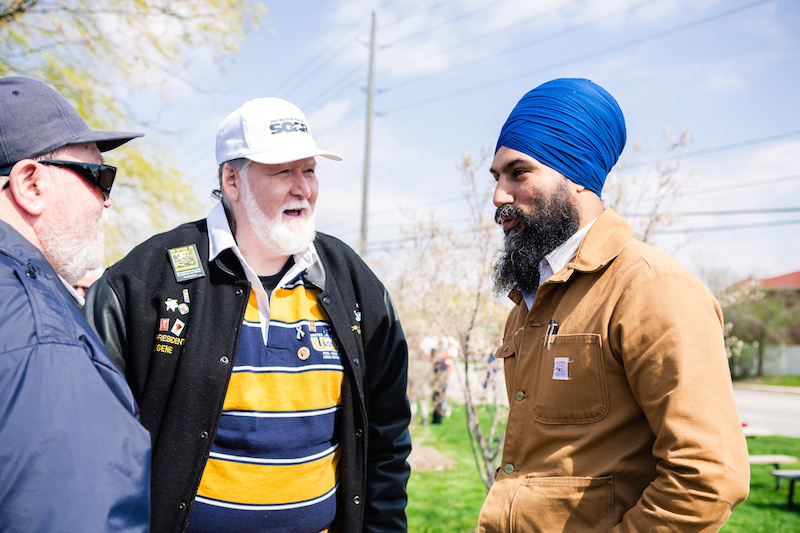Prime Minister Justin Trudeau has decided to call a by-election for early December in a vacant eastern Ontario riding, but has made a point of not calling by-elections for three other vacant seats, including, most notably, Burnaby South, where NDP leader Jagmeet Singh has declared his candidacy.
The eastern Ontario riding in question, Leeds-Grenville-Thousand Islands and Rideau Lakes, became vacant when its MP, Conservative Gordon Brown, died last May. The other vacant seats are York-Simcoe in Ontario, from which Conservative Peter Van Loan resigned at the end of September, and Outremont in Montreal, which former NDP leader Tom Mulcair officially vacated in August.
According to the law, a prime minister can delay up to 180 days (about six months) before calling a by-election. That six-month window gives heads of government a lot of latitude, but there is an unwritten expectation that they will not abuse it for partisan purposes.
The NDP is outraged that Trudeau appears to be quite capriciously delaying the three by-elections.
Burnaby South became officially vacant on September 17, which means Trudeau could delay the announcement of a by-election until March 18. In the case of Outremont, the vote must be called no later than January 30.
Neither the PM nor his office have offered any explanation for these delays. Instead, they say the 180-day cut-off date for the eastern Ontario seat is imminent. It is, in fact, this Tuesday, October 30, while the dates for the others are further off in the future. That hardly qualifies as justification or rationale for a decision. It merely tells us what we already know.
And so, since the government refuses to provide its own explanation, we’ll try to do so here.
The Burnaby South seat was recently vacated by NDP MP Kennedy Stewart, who is now the mayor-elect of Vancouver. Of late, the riding has been looking like a very unlikely win for the Liberals. Indeed, the Liberals are so concerned about doing badly in Burnaby South that they have openly mused about the idea of not even running a candidate against NDP leader Singh. Such a gesture would, they say, be a courtesy to a party leader who does not have a seat in the House.
The reason for the downturn in Liberal fortunes in that part of British Columbia does not have much to do with the NDP leader. What hurts the Liberals is the fact that the voters of Burnaby South are, by and large, deeply unhappy with the Trans Mountain pipeline project. That twinned pipeline carrying toxic bitumen is slated to cut right through their community.
A by-election in Burnaby South could turn into something of a referendum on the $4.5-billion pipeline, which the Canadian people now own. Such a de facto plebiscite is something the Liberals want to avoid at all costs, because the pipeline project is at a highly delicate phase right now.
On orders of the federal court, the government has reopened the consultation process on the pipeline. It is studying how to mitigate the threats shipping bitumen poses to the fragile coastal environment, something it forgot to do on the first go-round. Talks have reopened with a number of Indigenous communities who have expressed profound concerns about potential impacts on their environment and way of life. The court was brutal in its assessment of the federal government’s original Indigenous consultations. It described them as the worst kind of patronizing tokenism.
Chastened by the judges’ decision, the Liberals hope they can make it all work this time.
Their game plan is for this new process to gain them at least increased, if not unanimous, buy-in. And they want to wrap it all up early in the new year, allowing them to re-start construction long before the next federal campaign. The background noise of a by-election campaign in the riding that is, in effect, ground zero for resistance to the pipeline would not be helpful.
As for Tom Mulcair’s former seat in Outremont, it is unlikely the Liberals are particularly nervous about that one.
Until Mulcair won the seat in a 2007 by-election, Outremont was about the safest Liberal seat in the country. The Liberals had only lost it once previously, in 1988 when the Mulroney Conservatives swept Quebec in the free-trade election.
The NDP has found itself a strong candidate for the Outremont race in Julia Sanchez, who most recently headed the Canadian Council for International Cooperation. She is articulate in both official languages and has many years of public policy experience. But in the coming by-election, she will be a distinct underdog. Her party is not polling well in Quebec and did poorly in recent by-elections there.
The Liberals would probably be quite happy to throw the dice in Outremont, and as soon as possible. Doing so would be awkward, though, because their refusal to fire the starting pistol for Burnaby South would then really stand out like a sore thumb.
And so, the citizens of a riding in Quebec and another in Ontario will have to do without representation in Parliament for a few months more, because the governing Liberals want to avoid an awkward and embarrassing political fight in British Columbia.
Karl Nerenberg has been a journalist and filmmaker for more than 25 years. He is rabble’s politics reporter.
Photo: Jagmeet Singh/Flickr
Help make rabble sustainable. Please consider supporting our work with a monthly donation. Support rabble.ca today for as little as $1 per month!




